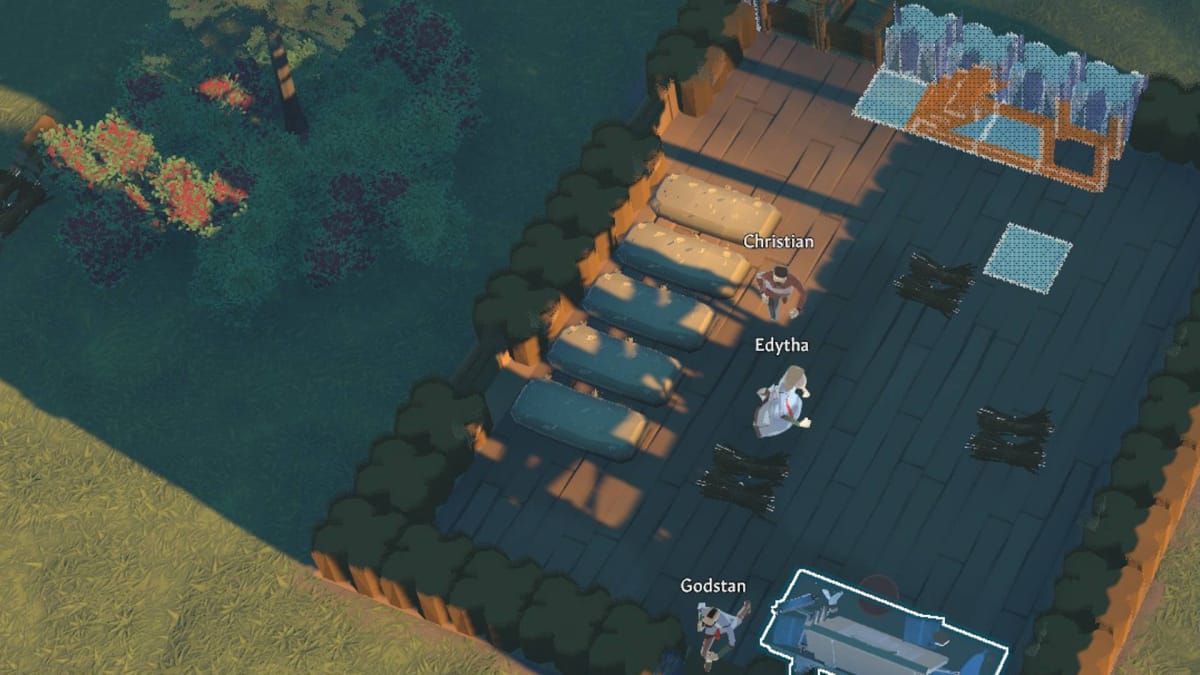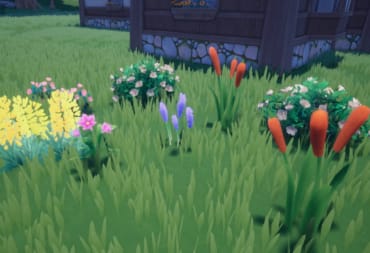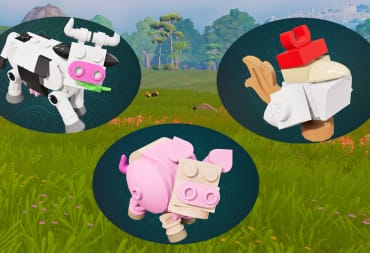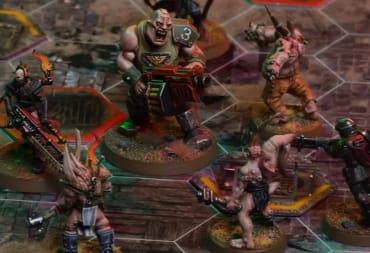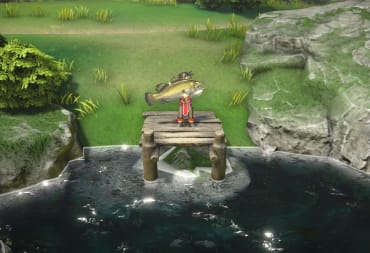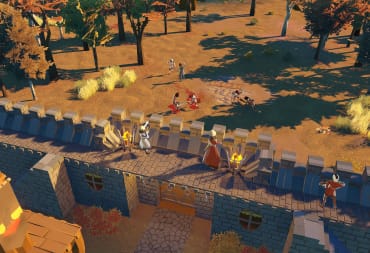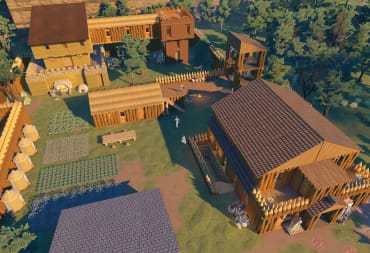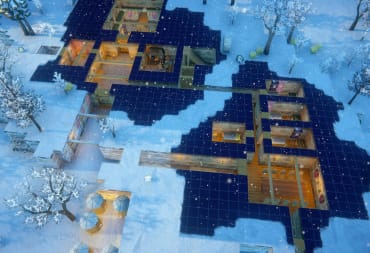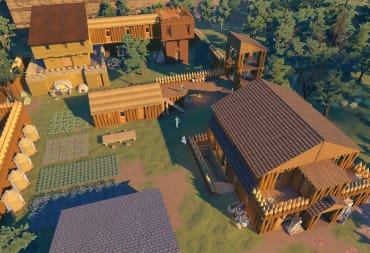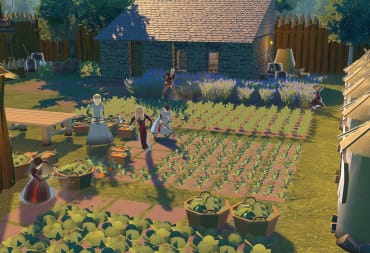Colony sims can be a challenge! Our Going Medieval Guide for Beginners will tell you what you need to know to play this new colony sim game — and how to survive your first year in Going Medieval!
What is Going Medieval?
Going Medieval is a new colony sim game developed by Foxy Voxel and published by The Irregular Corporation. Set in the late 14th century (that is, the 1300s), you and a group of Settlers head out into the wilds with a handful of supplies and a dream of making a new life for yourselves.
If you've never played a colony sim, you're going to need to know some things. It might look like a base builder or a real-time strategy game, but it can be much more complex than that. The stats of every individual item are tracked. Your Settlers' health, moods, and skills are tracked. You can build a bustling castle, but the focus is going to be on a smaller group of people.
Finally (and perhaps most importantly), you have to keep in mind that Going Medieval is launching in Steam Early Access. Even if you're familiar with colony sim games, there may be some features you're looking for that just aren't there yet. It's very much a playable game, though, and you're in for a challenge!

Going Medieval Mechanics You Need to Understand | Going Medieval Tips & Tricks
There's a lot to unpack in the Going Medieval Guide for Beginners. A helpful in-game Almanac can break down many of the game's mechanics, so I'm just going to touch on the basics here.
Settler Skills
There are 13 different Settler skills in the game including things such as Construction (the ability to build things), Culinary (the ability to cook),.Intellectual (the ability to Research), and Speechcraft (the ability to socialize and persuade). All of these skills have their uses, but some are more important than others.
Additionally, Settlers can have "stars" on their skills that indicate a passion for that particular skill. One star means that they get 2.5x XP when raising that skill, and two stars provide a 4x XP bonus.
Settler Perks
Settler Perks are permanent buffs and debuffs that are a part of a Settler's personality. In my experience, Settlers have 2–4 random Perks and they can be quite the mix. You could, for example, have a Settler who is extra cheerful and congenial who also happens to love bar fighting. Perhaps you'll get lucky and have a workaholic Settler who needs very little sleep. Or, perhaps, you'll end up with a Settler who is very sickly and prone to injury.
Settler Stats (Needs)
Settler Needs cover the five core things that you need to provide for your Settlers to keep them happy. These are:
- Food
- Sleep
- Religious Activities – praying to their preferred god (out of two choices).
- Alcohol Requirement
- Entertainment Activities
All of these can be affected by Perks, either positively or negatively. One Settler might not care for alcohol and another might need alcohol to get through the day. Paying careful attention to your Settler stats is important for long-term success.
Settler Mood
Settler Mood is... well, it's the Settler's mood. This simple bar determines whether a Settler is happy or whether they'll get fed up and leave your town forever. Good events in recent memory (such as eating a good meal) increase their Mood. Bad events (such as not fulfilling their religious needs) can decrease their Mood.
Settler Health
Finally, Settler Health is one of the most important screens in the game for your people. If their Hit Points drop to zero, they're toast. There are also sub-bars for Blood, Consciousness, Pain, and Stomach.
Settlers who are injured (either by an accident or in battle) will be wounded and these wounds will be shown on this screen. Wounds often give debuffs such as reduced movement speed. Failing to properly treat a wound means your Settler will take longer to recover — if they recover at all.
Are There Children in Going Medieval?
No, there are no children in Going Medieval. Many colony sims have family mechanics, but nothing like that has been implemented in the game just yet. For now, you can look forward to getting new Settlers through random events.
Rooms (and Their Bonuses)
I've largely focused on the Settlers, but let's take a moment to talk about Rooms. Four walls, a floor, and a roof make a "Spare Room." Meet the right conditions, however — typically including some furniture, excluding other furniture, and occasionally meeting a certain size — and you'll get some neat bonuses. It's especially helpful to get the Library room to speed up Research even more.
As you play, consider using Research to unlock the items you need to properly set up Rooms and get their associated bonus — they can be a huge help in the long run.
Temperature
Temperature is a mechanic that will probably screw over a lot of new players. If it's hot outside, your food is going to spoil much faster than if you stored it in a cool place — you're probably going to have to dig underground to properly store your food.
How Long Does a Season Last in Going Medieval?
Going Medieval Seasons last 12 days.
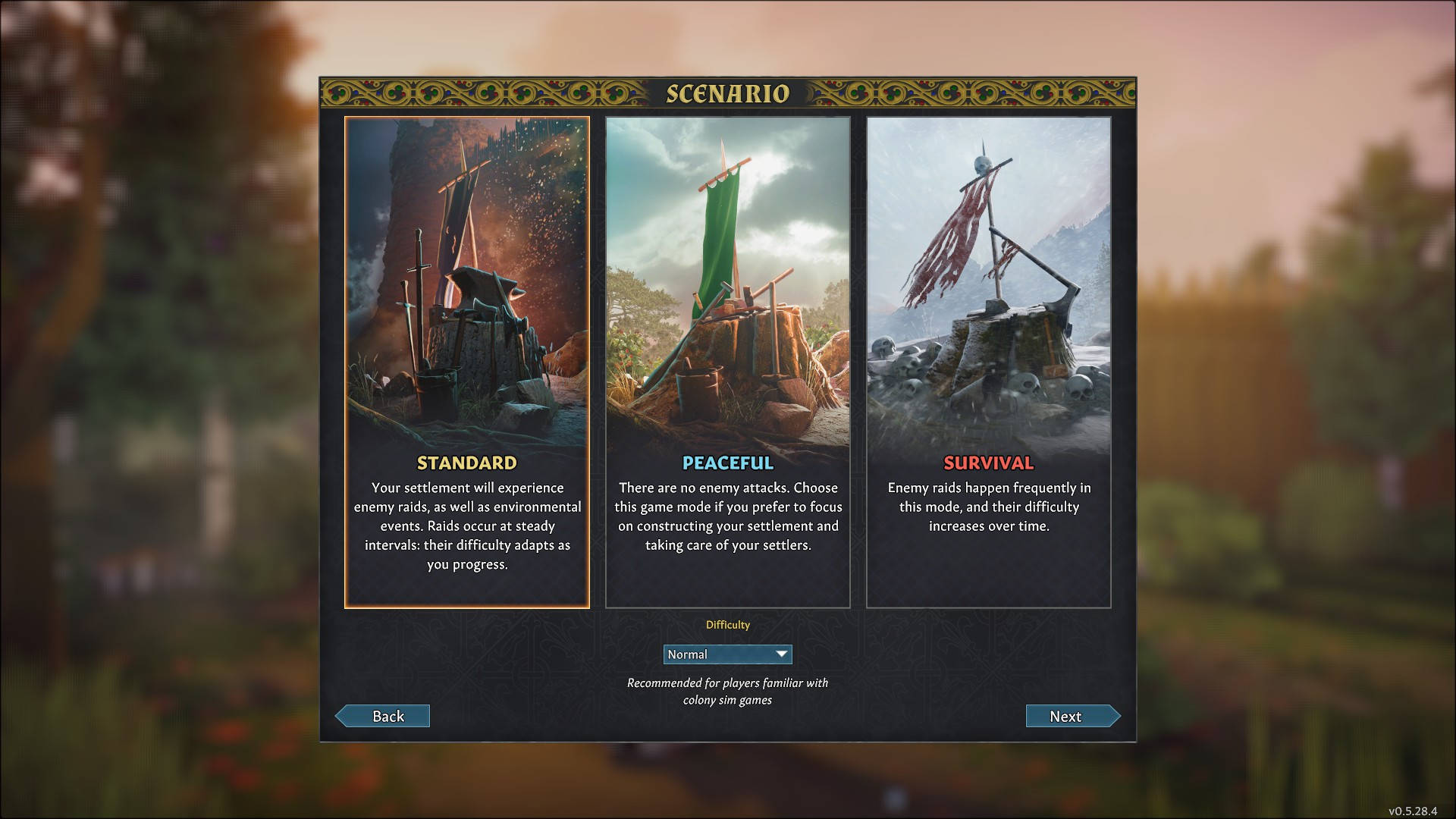
The Going Medieval Guide for Beginners — Tips For Getting Started
Starting a new game of Going Medieval isn't quite so easy as pushing a button. Well, you could do something like this, but it would be a very bad idea. Let's go over the steps!
Step 1: Choosing your Scenario & Difficulty
The Going Medieval Scenario determines the style of play you'll experience.
- Standard – Your settlement will experience enemy raids, as well as environmental events. Raids occur at steady intervals; their difficulty adapts as you progress.
- Peaceful – There are no enemy attacks. Choose this game mode if you prefer to focus on constructing your settlement and taking care of your settlers.
- Survival – Enemy raids happen frequently in this mode, and their difficulty increases over time.
We'll be going with the default choice of the Standard Scenario for this guide.
Step 2: Choose Your Starting Conditions
Next up is your Starting Condition. There are three choices:
- A New Life – 3 Settlers and a healthy amount of supplies, starting in Spring.
- Lone Wolf – A single Settler heads out into the wilderness, starting in Winter.
- Add new – Create your own scenario.
We'll go with the "A New Life" Starting Conditions as that is recommended for new players.
Step 3: Choose your Settlement Location
Your Settlement Location determines what you'll have on your game world map and how plentiful specific resources are. Here are your choices:
- Valley – Plentiful vegetation, fertile soil[,] and clay. Moderate amount of limestone. Lesser amounts of gold, silver, iron[,] and salt.
- Hillside – Uneven terrain, suitable for a good defensive position. A fair amount of limestone and clay. A moderate amount of fertile soil and vegetation.
- Mountain – Plentiful limestone, gold, iron[,] and silver. Lesser amounts of fertile soil, clay, and vegetation.
For the purposes of this Going Medieval Guide for Beginners, we're going with the default choice: the Valley.
Step 4: Pick Your Settlers
Finally, you have to pick your Settlers. You are automatically given three choices, but you don't need to keep them — you can randomly re-roll new Settlers for a chance at getting something better.
I recommend getting Settlers no older than 35 so that you can get the most potential out of them in the long term. The choices you make here can make your game a lot easier... or a lot harder.

What Starting Skills Should I Have for My Settlers?
Your Settler starting Skills are probably the most important choice you'll make here. It's not about the skills themselves; rather, it's about the stars (and the XP bonus they represent). Granted, having a Settler with a high skill right out of the gate is nice – but the ability to learn faster, however, will prove much more useful in the long term in my opinion.
I recommend that your starting team of Settlers has one person focusing on each of these three skills:
- Construction – You're going to be doing a lot of building in the early game. Having someone who gains Construction XP quickly will be a boon.
- Culinary – While you do start with some food, your Settlers will be happy with prepared meals. This is an easy early-game way to boost mood (and take care of that Hunger bar, too).
- Intellectual – This skill drives Research, and having a dedicated Research expert will help you unlock useful stuff faster.
Keep in mind, your Settlers can have more than a single skill with one star (2.5x XP bonus) or two stars (4x XP Bonus). Having the following skills in addition to the above can be helpful:
- Botany – Dedicating a Settler to grabbing plants can keep the plants from getting ruined.
- Marksman – A good Marksman makes a good hunter (and a good ranged warrior!).
- Medicine – When things go bad, you'll be glad you have someone with Medicine skills to patch you up.
- Melee – You only start the game with a single bow, so having stars on the Melee skill for one (or both) of the other two Settlers will help them make the most of their starting weaponry.
To emphasize: you want one Settler with two stars in Construction, one Settler with two Stars in Culinary, and one Settler with two stars in Intellectual. Getting some other Skill stars (or base experience) can be good, too. It's worth spending a few minutes hitting the "Randomize" button until you get something you're comfortable with.
Step 5: Confirm Your Choices
Your final step is to review all of the choices you've made before actually starting the game. Once you do, you'll have a new world generated with its own dedicated save file. Now it's time for the game to actually begin!
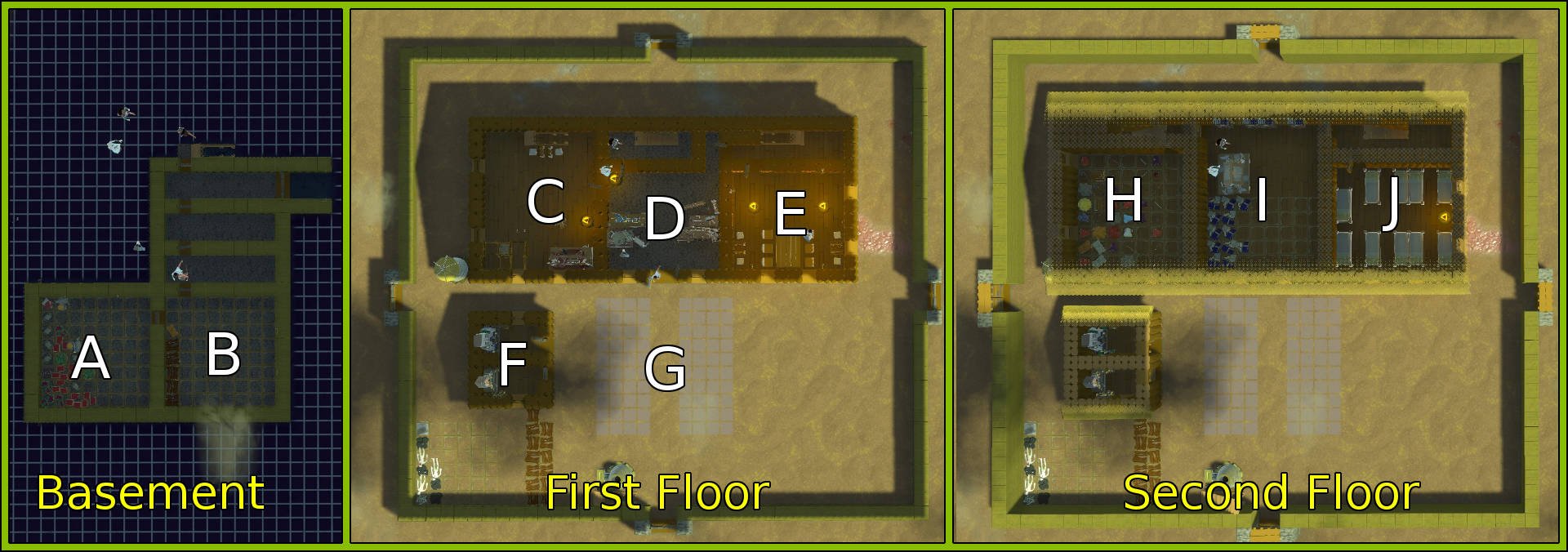
Building Your First Going Medieval Base
Building your first Going Medieval base will probably be a failure. Much like Dwarf Fortress or Rimworld, the fastest way you'll learn will be by messing up really badly. Fortunately, starting a new game creates a save file, so it's very easy to restart with the same Settlers on the same map and try again.
Before we continue, I should note that this strategy worked for me — this allowed my Settlers to survive for a year and be more or less happy. You might want to try something different!
Once you're in the game, your very first step will be to pause the game. All of your supplies are "Forbidden," meaning your Settlers will not touch them until you mark them as usable. Select the hand tool on the bottom right and drag it over your starting items to remove the "Forbidden" tag.
Now, it's time to get building! I'll break down what you should focus on for each season. Remember, each season only lasts 12 days!

Spring, Year 1 – Planting Crops & Digging Down
Your first 12 days in the game are going to be hectic — there's a lot to do! Here's a quick checklist:
- Build a small cabin
- Build the first 1/3 of your starting house
- Research Architecture
- Research Agriculture
- Plant your first crops
- Start digging a basement
- Get your first new Settler
- Fight your first Battle
Your first immediate step should be to build a house 10 blocks wide by 12 blocks long (8x10 internally). Build 5 Hay Sleeping Spots, 1 Research Table, 1 Campfire, and 1 Backgammon Table on the floor. Don't worry about a roof just yet — your Settlers will sleep in the cold for the first few nights, but this is more efficient in the long run.
Once you've planned all of that out, it's time to set your Settlers' Jobs and Schedule; we're also going to Manage their equipment.
The Jobs Screen
The Jobs Screen determines how your Settlers prioritize tasks from 1 (most important) to 5 (least important). All Jobs start at 3 by default.
Set each of your three Settlers to 1 for their respective strengths in Construction, Culinary, and Intellectual. Set your Construction-focused Settler's "Hauling" Job to 2 so that he prioritizes that a little more when he's not building. Make sure to adjust it as you get new Settlers!

Beyond that, you can set any other 1-star or 2-star skills to higher priority so that your Settlers can take advantage of their passions.
The Schedule Screen
The Schedule Screen determines how your Settlers will spend their time between Work, Sleep, and Leisure. Your Settlers will get grumpy if they don't get enough sleep or enough time to relax; here's how I set mine up:

Managing your Settlers
Finally, we want to set up your Settlers' equipment. Set your best Marksman to "Ranged" for their weapon. Set your Second Settler to "Melee One-Handed" for their weapon and "All Shields" for their shield. Your third settler should get "Melee Two-Handed" and "Any Armor." This gives you a nice balance when it comes time to fight.
Moving on from there, we're going to go to the Research screen and immediately unlock Architecture; this will allow you to build Wooden Beams which are helpful for keeping floors from collapsing. Place some Wooden Beams on the first floor of your 10x12 building, build some stairs, and build a second floor. Then, build a roof on top.
It will take some time for this construction to be finished; you will probably have to chop down some trees by clicking on them and tagging them to be chopped down. You may also want to harvest some Redcurrants and Mushrooms; these two food items can be combined to make Stew, a much better meal than eating raw food.
Set your Campfire to keep cooking meals until you have 10 Stew or so. Set your Basic Research Table to keep producing Research until you have 20 Chronicles. Unlock the Agriculture Research, select the "Zone" button on the bottom left, and then plant 5–10 squares each of the following crops:
- Cabbage
- Flax
- Carrot
- Beet
- Barley
- Herbs
Don't worry about Redcurrant, Tall Grass, or Birch Trees just yet — there are plenty of those to go around for now. (Herbs do generate naturally, but they're rarer and more spread out.)
Your bigger building should be complete soon — use the Zone tool to make the entire second floor a Stockpile for everything, with two exceptions: Click on the zone and uncheck:
- Carcass
- Waste
- Materials > Sticks
Place one smaller Zone outdoors and set it up to only hold Sticks (Materials > Sticks). Set another smaller zone nearby and set to only accept Carcass and Waste.
Now it's time to start digging your basement. As I explained in the "Temperature" section above, you want a cold space underground to store your food. Dig out a few spaces of earth nearby, build a staircase, and repeated until you hit the bottom. Make sure to manually save your game frequently after each step — it's very easy to make a mistake while digging underground and trap your Settlers.
When Day 7 arrives, you'll get your first new Settler: an escaped prisoner.
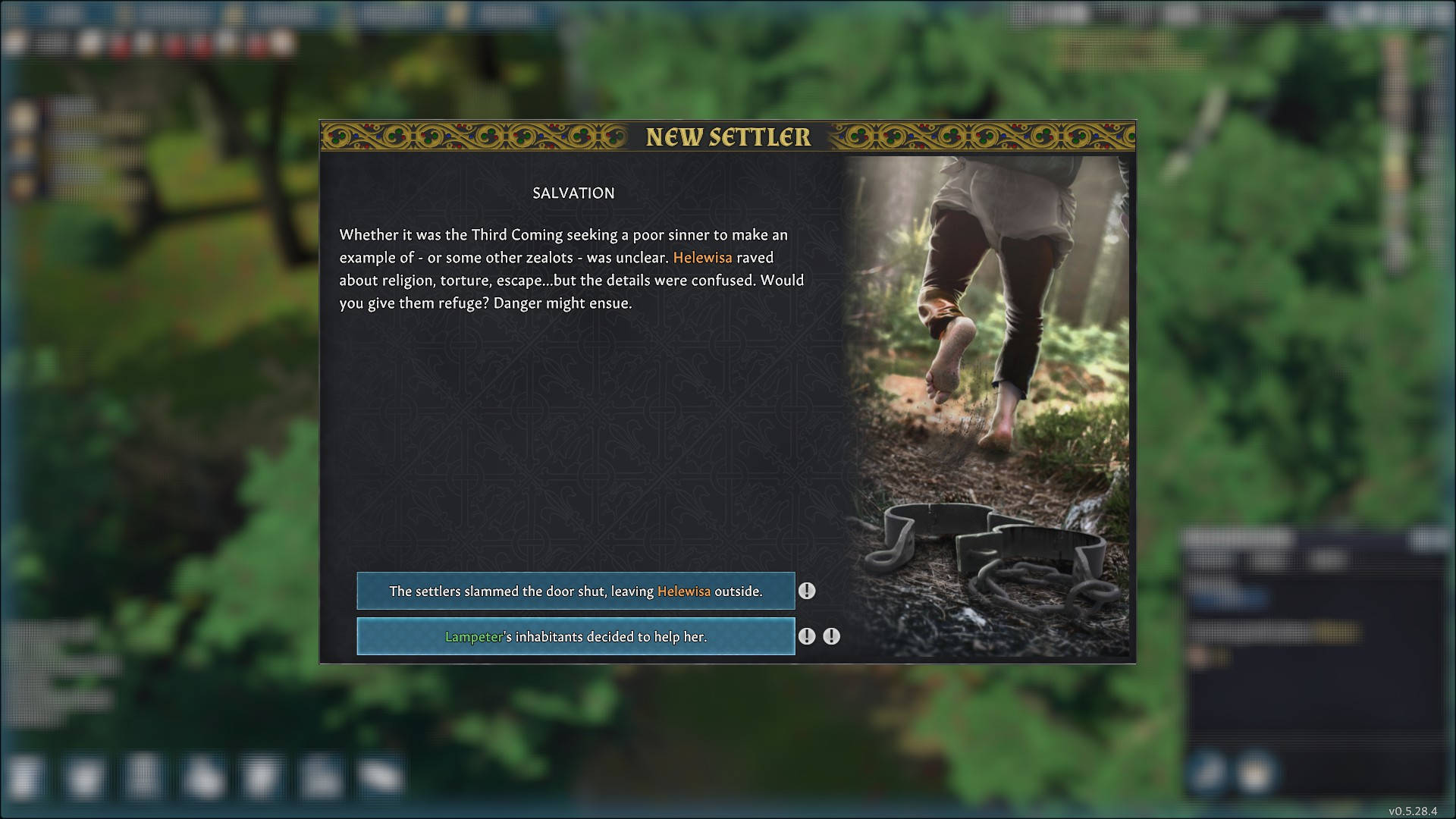
You have two choices: shoo them away or take them in. If you make them leave, your Settlers will get a Mood debuff. If you take them in, your Settlers will get a Mood buff and you'll have an extra pair of hands to help out from this point forward — but you'll also face your first battle.
Assuming you let the escaped prisoner join you, the first thing you'll want to do is go into the new Settler's inventory and unequip any shackles they may be wearing. Once this new Settler goes into bed, manually click on another Settler and then click on your new resting Settler and select the option to tend to their wounds; this will help them heal faster. You now have a clock on the screen counting down towards your first battle. Make sure to set up the new Settlers equipment!
The first piece of combat will feature three lightly armed and armored enemies. I've fought this battle a dozen times and didn't lose anyone, and you can do the same.
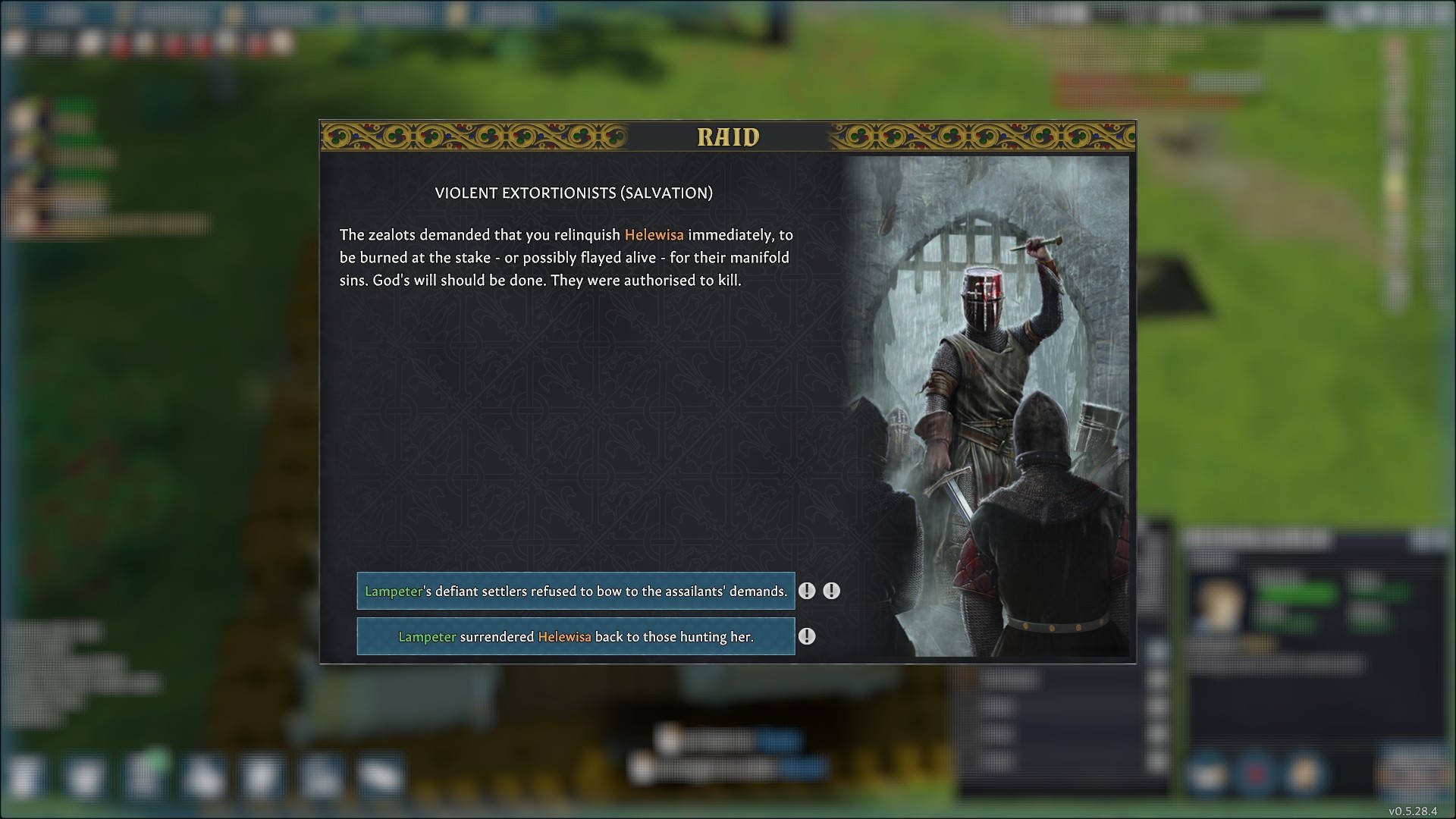
When the bad guys come, they'll give you another chance to surrender your new Settlers. Ignore them and get ready to fight — click the "draft" button (the horn) for each Settler on the Manage screen; you can now control them like a real-time strategy game.
Select your four Settlers as a group and send them towards the bad guys. You'll want to target each enemy with all four Settlers one at a time. Kill two and you'll win the battle! The third and final fighter will try to run away; you can either attempt to kill them or let them go.
With the battle now over, it's time to clean up. Make sure the corpses of the dead are set to Restricted so your Settlers don't try to store them in your stockpile. Turn off the Restricted tag on all of the dead guys' equipment. Tend to your Settlers wounds and then get back to work — you only have a few more days before Summer arrives.

Summer, Year 1 – Getting Food & Prepping for Battle
When Summer arrives, things will quite literally start heating up. You'll start bringing in many more crops, but you'll also quickly lose food to spoilage. Here's what's on the agenda for Summer, Year 1:
- Get your fifth Settler
- Build a church
- Complete your basement food storage
- Double the size of your main building
- Collect as much food as possible
You'll get a fifth Settler very early in the month. This one is a freebie — they'll simply join you without any bad guys behind them. Set up their Schedule and Jobs and put 'em to work!
Keep working on digging that basement; I recommend an ultimate goal of an 8x8 area underground that can stay under 10 degrees Celsius at the minimum. (If you can make it under 5 degrees Celsius, your food won't spoil at all!) Unfortunately, each map is different — you'll have to experiment.
While this digging is going on, you're going to want to build a church. Build a 7x7 building separate from your main building. Place a wall straight down the middle to split it into two 2x4 interior spaces. Place a shrine in each half so your Settlers can pray to either religion. This will help keep their mood up in the coming months without taking up too much space.
We're also going to aim to double the space of your main hall. Add on another 10x12 section. The first floor will be focused on workshops — making wooden weapons, making clothes, etc. The second floor will be dedicated to Research. Deconstruct your Research table, build a new one on the second floor of this new addition, and create a new stockpile that only stores books. Make sure to uncheck "books" in your other stockpiles!
Additionally, take a bit of time to replant Birch trees from the same screen where you plant crops. You've probably chopped down quite a few and they take a lot of time to grow to maturity; it's best to get started now.
Once your basement is done and ready to go, you're going to want to set up a new stockpile. Make sure only the following are checked off:
- Food > Meal
- Food > Raw
- Material > Herbs
Don't forget to uncheck these same entries on your other stockpiles so that all of your food is stored in one place! The checklist for Summer is shorter, so keep on gathering food and supplies.

Autumn, Year 1 – Preparing for Winter
Autumn is when things start to cool down. You're going to have an even tougher battle ahead — here's what you need to do for this month:
- Expand your main building again
- Get your sixth Settler
- Continue to store food and supplies
- Survive your second battle
We're once again going to expand the main building with a new 10x12 section. The first floor will be for a Great Hall and the second floor will be a Shared bedroom. Research Furniture if you haven't already to build some nice chairs in the Great Hall and some even nicer beds upstairs. Build 10 beds on the second floor, and make sure to leave one or two free spaces to build a Brazier later in Winter.
A sixth Settler will join you. As before, set up their Jobs and Schedule and put them to work.
Later on in the month, you'll have a battle against 5 somewhat stronger opponents. You should be able to decently equip all of your Settlers with arms and armor from the previous battle you've won; you can also optionally craft new wooden weapons if you want to do the Research and build the necessary workstations.
You'll fight this second battle just as you did before — Draft all of your Settlers and target one bad guy at a time, pulling back any injured Settlers to prevent them from dying. Kill four out of the five bad guys and you'll win. Once again, you'll want to mark their bodies as Forbidden and turn the Forbidden tag off of the dead peoples' equipment.
This second battle is the major event of the month — once it's over, it's time to buckle down and get every last bit of food that you can before winter comes.

Winter, Year 1 – Surviving the Cold
Our Going Medieval Guide for Beginners closes with a very short checklist for Winter, Year 1:
- Build Clay Braziers so you don't freeze to death
- Get your Seventh Settler
- Build a wall around your town
- Fight your third battle
- Survive
Your first mission should be to build a few Clay Braziers throughout your main building. Build at least one in your Shared Bedroom to start, then build one more in each of the other major rooms. (Do not build a brazier in your food storage area — tit heats up the room and that defeats the point!)
Now is a good time to get started on building a simple wall around your town. I built mine out of Clay simply because it was abundant and there weren't enough trees nearby; using any material is preferable to no walls. Make sure to leave some room to expand!
You'll also get your seventh Settlers — another prisoner escape event, just like in Spring! That means another battle is coming, too — deal with it the same way as you already have in Spring and Autumn.
If you've done things right, you should have more than enough food to last the winter. Spring, Year 2, will be here before you know it, but this is where our Going Medieval Guide for Beginners comes to an end.

Spring, Year 2 and Beyond
That's it for our Going Medieval Guide for Beginners, and now there's only one question left — what next?
You've already grasped most of the major mechanics you need to understand if you've managed to survive this far. Future battles will be much tougher — you'll have to fortify your town, continue to Research, and keep everyone alive. It won't be easy and there are a lot of hard choices to make, but you're well on your way to surviving for a long time.
There are some things I didn't touch on in the Going Medieval Guide for Beginners. Research will be important as the game moves on; you should continue to work on that wherever you feel the need. I survived just fine with a Campfire and without liquor production, but you may want to get it going in your first year. As long as this guide is, I've really only covered the basics.
You might decide to start building a massive castle nearby and gradually abandon your old home. You might want to take all of the knowledge you learned and try to develop your own strategy right from the beginning. There's a lot more to explore in Going Medieval — good luck!
Have a tip, or want to point out something we missed? Leave a Comment or e-mail us at tips@techraptor.net
